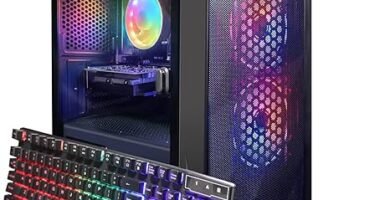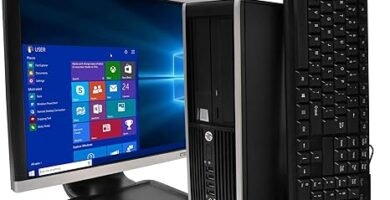How to Choose the Perfect Desktop Hard Drive Type for Your Needs
When choosing a hard drive for your desktop, understanding the different desktop hard drive types is crucial for optimizing performance and storage capacity. Whether you’re a gamer, creative professional, or general user, selecting the right type of hard drive can significantly affect your PC’s performance. In this article, I will guide you through the characteristics, pricing factors, pros and cons, and the overall benefits of each desktop hard drive type, featuring well-known brands such as Western Digital, Seagate, and Samsung.
Characteristics of Desktop Hard Drive Types
There are three main types of desktop hard drives: HDD (Hard Disk Drive), SSD (Solid State Drive), and SSHD (Solid State Hybrid Drive).
- HDDs (e.g., Western Digital Blue, Seagate Barracuda) are mechanical drives that store data on spinning magnetic disks. They offer large storage capacities, typically ranging from 1TB to 18TB, but are slower than SSDs. HDDs are ideal for users who require a lot of storage at a low cost.
- SSDs (e.g., Samsung 970 Evo, WD Black SN750) store data using flash memory and are significantly faster than HDDs. They come in sizes ranging from 128GB to 4TB. SSDs are best suited for users who prioritize speed, such as gamers and professionals, as they drastically reduce boot times and increase overall system responsiveness.
- SSHDs (e.g., Seagate FireCuda) combine the large storage capacity of HDDs with the speed of SSDs by using a small SSD portion to cache frequently accessed data. They offer a balance between storage space and performance but are slower than pure SSDs.
Why Is Desktop Hard Drive Type Priced the Way It Is?
The pricing of desktop hard drives varies based on the technology and storage capacity:
- HDDs like Western Digital Blue and Seagate BarraCuda are cheaper per gigabyte because they use older, mechanical technology. For example, a 2TB HDD can cost as little as $50, while an SSD of the same size may exceed $200.
- SSDs (e.g., Samsung 970 Evo or WD Black SN750) are more expensive due to their superior speed and durability. These drives are perfect for high-performance tasks like gaming and video editing, though they come at a higher price.
- SSHDs (e.g., Seagate FireCuda) fall somewhere in between, offering a mix of affordability and performance.
Comparing Desktop Hard Drive Types with Similar Products
When comparing desktop hard drives, SSDs outshine HDDs in speed, but HDDs provide more storage at a lower cost. Western Digital and Seagate HDDs are known for reliability and large storage, while Samsung and WD SSDs lead the way in speed and durability. SSHDs, like the Seagate FireCuda, offer a compromise by blending the best features of both.
Additionally, NVMe SSDs (e.g., Samsung 970 Evo), which use a faster PCIe interface, are pricier but offer blazing speeds, ideal for high-performance tasks like gaming and video editing.
Pros and Cons of Desktop Hard Drive Types
Pros of HDDs:
- Affordable and offer the largest storage capacities (Western Digital Blue, Seagate BarraCuda).
- Reliable for bulk storage, such as media collections.
Cons of HDDs:
- Slower speeds and mechanical failure risks compared to SSDs.
Pros of SSDs:
- Superior speed, durability, and lower power consumption (Samsung 970 Evo, WD Black SN750).
- Ideal for tasks requiring high performance, like gaming.
Cons of SSDs:
- More expensive per gigabyte than HDDs.
Pros of SSHDs:
- Balance between speed and storage at a moderate price (Seagate FireCuda).
Cons of SSHDs:
- Not as fast as a pure SSD.
Advantages of Desktop Hard Drive Types
HDDs like Seagate BarraCuda and Western Digital Blue offer massive storage capacities for users with large data needs. SSDs provide unmatched speed and responsiveness, perfect for booting systems and running applications. SSHDs, such as the Seagate FireCuda, are ideal for users seeking both speed and high capacity without breaking the bank.
Other Benefits of Desktop Hard Drive Types
HDDs are often used in backup systems due to their large storage capacity and reliability (e.g., Seagate IronWolf for NAS storage). SSDs are perfect for quieter environments because they produce no noise and generate less heat (e.g., Samsung 970 Evo). SSHDs improve system responsiveness while offering large storage, making them a great middle-ground solution.
Opinions on Desktop Hard Drive Types
Users praise SSDs like the Samsung 970 Evo and WD Black SN750 for their speed, especially in gaming and professional workflows. HDDs, like Western Digital Blue and Seagate BarraCuda, are often appreciated for their large storage capacities and affordability. SSHDs, such as Seagate FireCuda, receive mixed reviews, with some appreciating the balance between speed and storage, while others feel they don’t match pure SSD performance.
Frequently Asked Questions
What type of hard drive is best for gaming? An SSD, especially an NVMe SSD like the Samsung 970 Evo, offers the fastest load times for gaming.
Are hybrid drives worth it? SSHDs like the Seagate FireCuda are a good choice for users who want faster boot times but still need a lot of storage space.
Conclusions on Desktop Hard Drive Types
Choosing the right desktop hard drive type depends on your storage and performance needs. HDDs provide the most storage at the lowest cost, while SSDs offer the best performance with brands like Samsung and Western Digital leading the way. SSHDs are a great middle-ground option for users looking for a balance between speed and capacity (e.g., Seagate FireCuda). By understanding your specific needs, you can make an informed decision to enhance your desktop’s performance.









